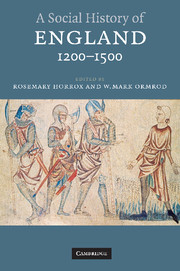Book contents
- Frontmatter
- Contents
- List of illustrations
- Preface
- List of contributors
- List of abbreviations
- 1 Introduction: Social structure and economic change in late medieval England
- 2 An age of deference
- 3 The enterprise of war
- 4 Order and law
- 5 Social mobility
- 6 Town life
- 7 The land
- 8 A consumer economy
- 9 Moving around
- 10 Work and leisure
- 11 Religious belief
- 12 A magic universe
- 13 Renunciation
- 14 Ritual constructions of society
- 15 Identities
- 16 Life and death: the ages of man
- 17 The wider world
- 18 Writing and reading
- 19 Conclusion
- Further reading
- Index
8 - A consumer economy
Published online by Cambridge University Press: 05 June 2012
- Frontmatter
- Contents
- List of illustrations
- Preface
- List of contributors
- List of abbreviations
- 1 Introduction: Social structure and economic change in late medieval England
- 2 An age of deference
- 3 The enterprise of war
- 4 Order and law
- 5 Social mobility
- 6 Town life
- 7 The land
- 8 A consumer economy
- 9 Moving around
- 10 Work and leisure
- 11 Religious belief
- 12 A magic universe
- 13 Renunciation
- 14 Ritual constructions of society
- 15 Identities
- 16 Life and death: the ages of man
- 17 The wider world
- 18 Writing and reading
- 19 Conclusion
- Further reading
- Index
Summary
Most discussions of the pre-modern economy focus on supply and production and analyse such factors as the volume of exports and imports, agricultural yields and industrial output. Demand, which is much harder to measure, has received far less attention, although the early and late modern periods have been the subject of a veritable explosion of scholarship on consumption and consumer society in the last twenty years. Few medievalists have taken up this challenge, however, due largely to the paucity of sources to explore the patterns and meanings of consumption. Indeed, the medieval sources are scarcely adequate to analyse the supply-side economy. Another stumbling block is the conventional chronology that locates a ‘consumer revolution’ in the eighteenth century but traces its first manifestations back to the late sixteenth and seventeenth centuries. In this scenario, the middle ages tend to be regarded as an undifferentiated period in which people were ‘users’ not ‘consumers’ and operated in a world of unchanging material poverty where objects were ‘things’ not ‘commodities’.
Yet considerable research now challenges this viewpoint, particularly work by Christopher Dyer on the standards of living within different social ranks during the middle ages. Richard Britnell and Bruce Campbell, among others, have traced growing commercialisation in the medieval economy, which made demand a more important motor in economic development. Historians of aristocratic and gentry spending, especially Christopher Woolgar, have spelled out in some detail the consumption practices of elite households.
- Type
- Chapter
- Information
- A Social History of England, 1200–1500 , pp. 238 - 259Publisher: Cambridge University PressPrint publication year: 2006
- 14
- Cited by



